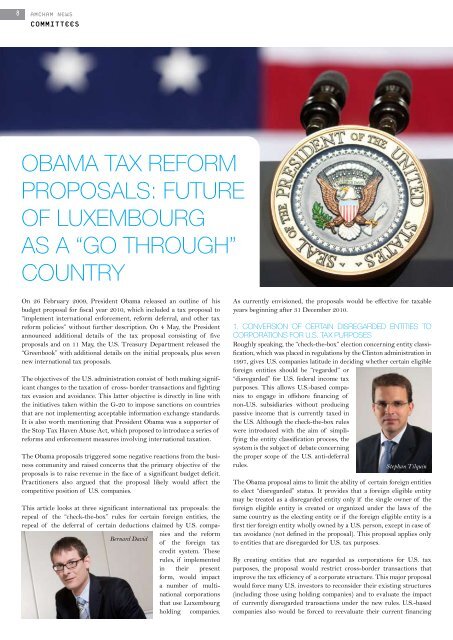Luxembo - The American Chamber of Commerce Luxembourg
Luxembo - The American Chamber of Commerce Luxembourg
Luxembo - The American Chamber of Commerce Luxembourg
- No tags were found...
You also want an ePaper? Increase the reach of your titles
YUMPU automatically turns print PDFs into web optimized ePapers that Google loves.
8<br />
AMCHAM NEWS<br />
COMMITTEES<br />
Obama Tax Reform<br />
Proposals: Future<br />
<strong>of</strong> <strong>Luxembo</strong>urg<br />
as a “Go Through”<br />
Country<br />
On 26 February 2009, President Obama released an outline <strong>of</strong> his<br />
budget proposal for fiscal year 2010, which included a tax proposal to<br />
“implement international enforcement, reform deferral, and other tax<br />
reform policies” without further description. On 4 May, the President<br />
announced additional details <strong>of</strong> the tax proposal consisting <strong>of</strong> five<br />
proposals and on 11 May, the U.S. Treasury Department released the<br />
“Greenbook” with additional details on the initial proposals, plus seven<br />
new international tax proposals.<br />
<strong>The</strong> objectives <strong>of</strong> the U.S. administration consist <strong>of</strong> both making significant<br />
changes to the taxation <strong>of</strong> cross- border transactions and fighting<br />
tax evasion and avoidance. This latter objective is directly in line with<br />
the initiatives taken within the G-20 to impose sanctions on countries<br />
that are not implementing acceptable information exchange standards.<br />
It is also worth mentioning that President Obama was a supporter <strong>of</strong><br />
the Stop Tax Haven Abuse Act, which proposed to introduce a series <strong>of</strong><br />
reforms and enforcement measures involving international taxation.<br />
<strong>The</strong> Obama proposals triggered some negative reactions from the business<br />
community and raised concerns that the primary objective <strong>of</strong> the<br />
proposals is to raise revenue in the face <strong>of</strong> a significant budget deficit.<br />
Practitioners also argued that the proposal likely would affect the<br />
competitive position <strong>of</strong> U.S. companies.<br />
This article looks at three significant international tax proposals: the<br />
repeal <strong>of</strong> the “check-the-box” rules for certain foreign entities, the<br />
repeal <strong>of</strong> the deferral <strong>of</strong> certain deductions claimed by U.S. companies<br />
and the reform<br />
Bernard David<br />
<strong>of</strong> the foreign tax<br />
credit system. <strong>The</strong>se<br />
rules, if implemented<br />
in their present<br />
form, would impact<br />
a number <strong>of</strong> multinational<br />
corporations<br />
that use <strong>Luxembo</strong>urg<br />
holding companies.<br />
As currently envisioned, the proposals would be effective for taxable<br />
years beginning after 31 December 2010.<br />
1. Conversion <strong>of</strong> certain disregarded entities to<br />
corporations for U.S. tax purposes<br />
Roughly speaking, the “check-the-box” election concerning entity classification,<br />
which was placed in regulations by the Clinton administration in<br />
1997, gives U.S. companies latitude in deciding whether certain eligible<br />
foreign entities should be “regarded” or<br />
“disregarded” for U.S. federal income tax<br />
purposes. This allows U.S.-based companies<br />
to engage in <strong>of</strong>fshore financing <strong>of</strong><br />
non-U.S. subsidiaries without producing<br />
passive income that is currently taxed in<br />
the U.S. Although the check-the-box rules<br />
were introduced with the aim <strong>of</strong> simplifying<br />
the entity classification process, the<br />
system is the subject <strong>of</strong> debate concerning<br />
the proper scope <strong>of</strong> the U.S. anti-deferral<br />
rules.<br />
Stephan Tilquin<br />
<strong>The</strong> Obama proposal aims to limit the ability <strong>of</strong> certain foreign entities<br />
to elect “disregarded” status. It provides that a foreign eligible entity<br />
may be treated as a disregarded entity only if the single owner <strong>of</strong> the<br />
foreign eligible entity is created or organized under the laws <strong>of</strong> the<br />
same country as the electing entity or if the foreign eligible entity is a<br />
first tier foreign entity wholly owned by a U.S. person, except in case <strong>of</strong><br />
tax avoidance (not defined in the proposal). This proposal applies only<br />
to entities that are disregarded for U.S. tax purposes.<br />
By creating entities that are regarded as corporations for U.S. tax<br />
purposes, the proposal would restrict cross-border transactions that<br />
improve the tax efficiency <strong>of</strong> a corporate structure. This major proposal<br />
would force many U.S. investors to reconsider their existing structures<br />
(including those using holding companies) and to evaluate the impact<br />
<strong>of</strong> currently disregarded transactions under the new rules. U.S.-based<br />
companies also would be forced to reevaluate their current financing















